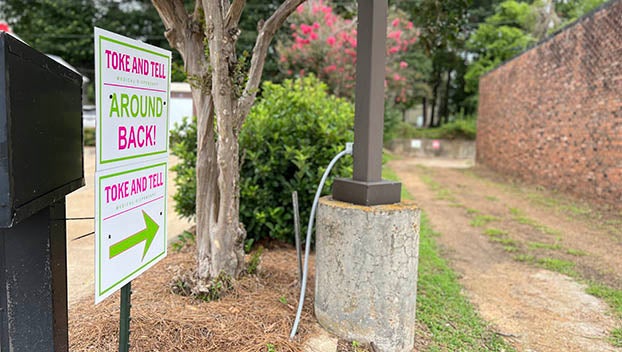Authors awarded honors: NLCC recognizes Wilkie, Hancock at ceremony
Published 12:03 am Sunday, February 24, 2013

Ben Hillyer / The Natchez Democrat — Hollywood screenwriter John Lee Hancock, at left, discusses the inspiration Horton Foote’s movies are to his own screenwriting after accepting the award in Foote’s name. At right, John Guice, right, straightens the medal hung around Curtis Wilke’s neck as one of the Richard Wright Award recipients at the Natchez Literary and Cinema Celebration Saturday at the Natchez Convention Center.
NATCHEZ — The first novel by a black author that veteran Mississippi reporter and author Curtis Wilkie read was “Native Son” by Richard Wright.
“It opened up for me an entirely new world from the one I was experiencing as a student at Ole Miss,” Wilkie said Saturday morning to the audience at the Natchez Literary and Cinema Celebration.
Wilkie was one of two writers honored with the Richard Wright Literary Excellence Award at this year’s NLCC writing awards ceremony.
Wright, James Baldwin and other black writers opened Wilkie’s eyes, he said, to the separate worlds blacks and whites were living in during the Civil Rights Era. Their work, Wilkie said, helped him as a young reporter in the Mississippi Delta covering civil rights struggles.
“The movement really became a frame of reference for me for the rest of my career,” he said.
Wilkie graduated from Ole Miss in 1964 and got a job at the Clarksdale Press Register. Wilkie left Mississippi in 1969, he said, discouraged by the situation in the state. He went on to work for the Boston Globe and lived in Jerusalem.
Wilkie returned 25 years later to Mississippi and said he was astonished by the change that had occurred in the state and in the South. His friend and fellow writer the late Willie Morris, who also left Mississippi and eventually came back, asked Wilkie why he returned.
Wilkie read the ending to his book “Dixie: A Personal Odyssey Through Events That Shaped the Modern South” as what he said he has concluded is the answer for his return.
His words, he said, were inspired by those of Vernon Dahmer Jr., whose father, a Civil Rights leader, was killed in 1966 when the family’s home was firebombed.
“’I, too, believe I came home to be with my people,’” Wilkie read. “’We are a different people, with our odd customs and manner of speaking and our stubborn, stubborn pride.

Ben Hillyer / The Natchez Democrat — Hollywood screen writer John Lee Hancock leans over as Natchez author Greg Iles places the medal for the Horton Foote Award for Special Achievement in Screenwriting.
“And like our great river, which overcomes impediments by creating fresh channels, we have been able in the span of Willie’s lifetime and my own to adjust our course. Even though I was angry with the South and gone for years, I never forsook my heritage Eventually, I discovered I had always loved this place.”
Like Wilkie, Wright was also one of the first black writers whose work author Jesmyn Ward read.
Ward was also honored with the Richard Wright Literary Excellence Award Saturday. Ward could not be at the NLCC, but author David G. Sansing read remarks from Ward.
Being from a similar background as Wright, Ward said in her remarks that the award was meaningful to her.
“Wright and I are both Mississippi natives, of similar background, poor and rural,” Sansing read. “We share an interest in social justice and a complex relationship with our home state.”
Wright, along with other Mississippi writers Alice Walker and William Faulkner, helped Ward find her voice, she wrote.
Ward wrote about Hurricane Katrina after seeing firsthand Katrina’s ravages in 2005 in the book “Salvage the Bones,” for which she won a National Book Award for Fiction in 2011. Ward also penned “Where the Line Bleeds” and is working on a memoir titled “The Men We Reaped.”
Screenwriter and director John Lee Hancock was honored at the NLCC with the Horton Foote Award for Special Achievement in Screenwriting.
Hancock wrote the film “A Perfect World,” directed by Clint Eastwood. Hancock and Eastwood also collaborated on “Midnight in the Garden of Good and Evil.”
Hancock also wrote and directed “The Blind Side,” “The Alamo” and “The Rookie.”
The award was presented to Hancock by Natchez native and author Greg Iles. Iles pointed out that Hancock has worked with great actors such as Billy Bob Thorton, Tom Hanks, Emma Thompson and Kevin Spacey.
“A guy who can inspire that kind of trust on the part of some of our greatest artists and some of our greatest writers that they would put their careers in his hands, they trust that he will do right by them and do right by the material, that’s about the highest statement of confidence and accolade that anybody can get,” Iles said.
Hancock joked that what success he has had has come from surrounding himself with people that are smarter than him.
“And I have done that again today,” he said referring to the other writers honored at the ceremony.
One of Hancock’s proudest moments, he said, was the day he filed his tax return and listed “writer” as his occupation.”
“Now I made $11,000 that year and struggled, but I was a writer,” he said. “So I am very proud to be in this fraternity and group of fellow writers.”
Hancock, a Longview, Texas, native, said he aspires to the greatness that Horton Foote achieved in the screenwriting world. Foote is perhaps best known for his screenplay of Harper Lee’s novel, “To Kill a Mockingbird,” and also his screenplay “Tender Mercies.”
“He had an ability to recognize and identify quiet moments,” Hancock said. “Quiet moments that made you smile, quiet moments that catch in your throat, quiet moments that touch you.”
Hancock said growing up in Texas, he loved to write and wrote short stories nearly every day. He said, though, a career as a writer at times seemed out of reach.
“Growing up in Texas City, I actually knew somebody in a nearby town whose dad had been to the moon. I didn’t know anyone whose dad or mother was a writer, so it was a far more viable career option to go to the moon than to become a professional writer,” Hancock joked.
“So when I found out Horton Foote was from Wharton, that gave me great hope since it was only an hour away,” Hancock said. “So I thank Horton Foote for that, for giving me the possibility of perhaps challenging myself to be a writer. I love what I do, I’m the luckiest guy in the world.”
NLCC will wrap up its festivities today with final events, including a tour of the Forks of the Road, The Burn and the Natchez City and National cemeteries.
Tickets are $25 and available at the Natchez Visitors Reception Center.





